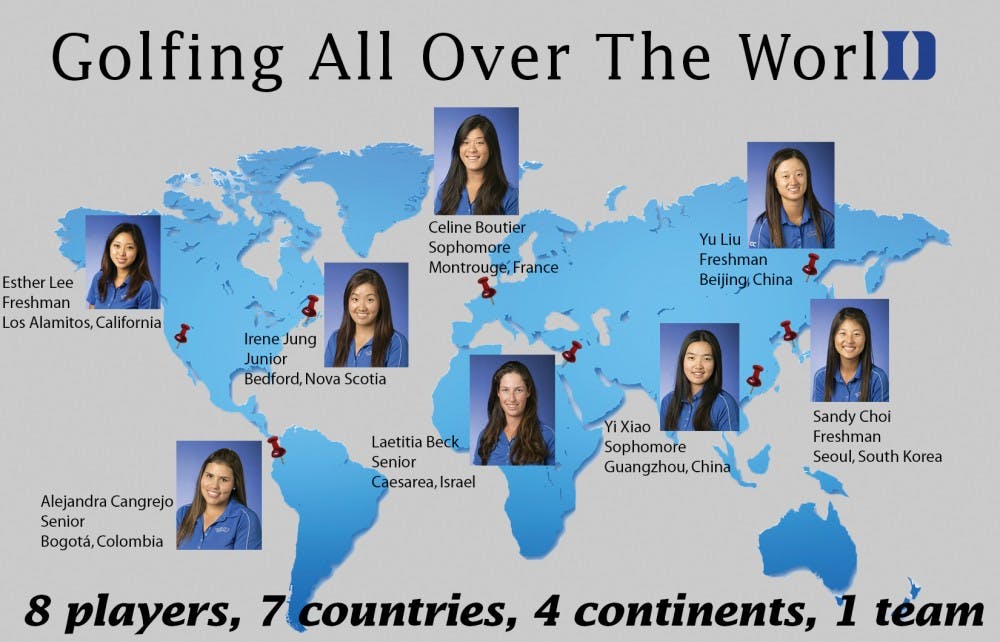Dubbed the “International House of Golf,” the 2002 Duke women’s golf team received national attention for capturing the NCAA championship with a team featuring five international players and just one American.
Twelve years later, Duke women’s golf is once again seeking to leverage diversity into the ultimate goal: a national championship. Ranked fifth in the nation, this year’s Blue Devil squad represents seven different countries on its eight-person roster.
“In order to be the best team in the country, you have to recruit all over the world,” assistant coach Jeanne Cho said. “That’s just the nature of the sport now.”
Just two of Duke's eight golfers are from the same country—freshman Yu Liu and sophomore Yi Xiao, both of whom hail from China. Senior Alejandra Cangrejo and sophomore Celine Boutier came to Duke from Columbia and France, respectively.
Senior Laetitia Beck grew up in Caesarea, Israel, which is home to the country’s only 18-hole championship layout. Canadian junior Irene Jung spent her childhood in Nova Scotia, Canada, playing golf just six months of the year due to weather. Both Jung and Beck attended boarding schools in Florida with the goal of developing their games in high school.

“This year, because we are all not from the United States, there is more understanding about our background,” Boutier said. “We’ve been through the same struggles, and I think it has been better.”
The influx of foreign talent across NCAA women’s golf since the early 2000s can be attributed largely to the student-athlete model of the United States, which allows college athletes to compete at the highest amateur level and earn a degree at the same time. If they were to stay in their home countries, most foreign golfers would be forced to choose between pursuing a career in the sport and continuing their educations after high school. American universities allow them to do both.
“College athletics is huge in the Unites States,” said Cho, who hails from France but played her college golf at Florida. “It’s almost nonexistent in other parts of the world.”
Although NCAA women’s golf has become increasingly international since Duke’s title run in 2002, the Blue Devils fielding a team comprised almost entirely of foreign players this season remains the exception to the rule. Arizona State is the only other top-10 team with more than four international golfers on its roster this season.
“This is probably as diverse as it’s been in my three years,” Jung said. “I see that we are probably the most diverse team on Duke’s campus, and that’s pretty cool.”
Due to Duke's success signing elite international talent, head coach Dan Brooks has developed a reputation for recruiting across the globe. Despite this success, Brooks has left the country just twice for recruiting during his 29 years at Duke. The allure of the NCAA and the nature of elite junior competition brings the world's top recruits to Brooks' doorstep.

“The minds of these prospects are definitely changing,” he said. “If you look around there’s a lot of foreigners playing. The level of golf is very, very good. You’ve basically expanded the pool of talent.”
In addition to creating a supportive team dynamic, the clash of cultures on the Duke squad has produced some light-hearted moments. From working through simple misunderstandings to learning to love the food of another teammate’s culture, openness and understanding are necessary parts of the team’s identity.
“Some of the funniest things that have happened are because someone is trying to negotiate the little cultural differences that exist in their communication with each other,” Brooks said. “We have a lot of fun with it.”
These discussions transcend mere translation. For parents who are deciding to send their children thousands of miles from home to a foreign country, Cho provides them with a comforting sense of familiarity. Cho continues to build and maintain relationships with international families throughout their four years on campus.
“Sometimes when you communicate, it’s not just about language,” Cho said. “Different cultures share different standards. You only have such limited opportunities to get to know these players, and when they come on campus you try to get to know as much as possible. I think the cultural differences are also a big part.”
On the team, English is spoken to avoid exclusion, and the amount of time the team spends together brings to light how much the players have in common despite the distance between their hometowns.
The pressures of a potential professional golf career, adjusting to Duke and living thousands of miles from home are all experiences the entire team shares.
“It’s amazing how much common ground there is,” Brooks said. “The fact that they are from a lot of different countries just sort of becomes a non-issue. It’s just there.”
After ending the 2013 season with a second-place finish in the NCAA Championships, Duke has its sights set on capturing a sixth national title this May. So far, the Blue Devils seem to be on track to replicate the success of the original “International House of Golf."
But whether or not the Blue Devils hoist a championship at the end of the season, the greatest impact this team has made may be off the course. A group of individuals that came from four continents, seven countries and eight unique experiences have forged a bond larger than their sport.
Get The Chronicle straight to your inbox
Signup for our weekly newsletter. Cancel at any time.

